academics
John XXIII's academic programs are uniquely designed. We can tailor each student's education to meet parents' educational goals.
Some parents rely on the Center for the entirety of their children’s education. Others collaborate with teachers to integrate homeschooling.
As an “aid to life,” the academic programs at John XXIII are uniquely designed to assist parents in meeting the intellectual and spiritual needs of their children at the Step-Up Toddler (1 1/2 - 3 years), the Primary (3-6 years), the Elementary (6-12 years), and the Adolescent Program (12-16 years) levels.
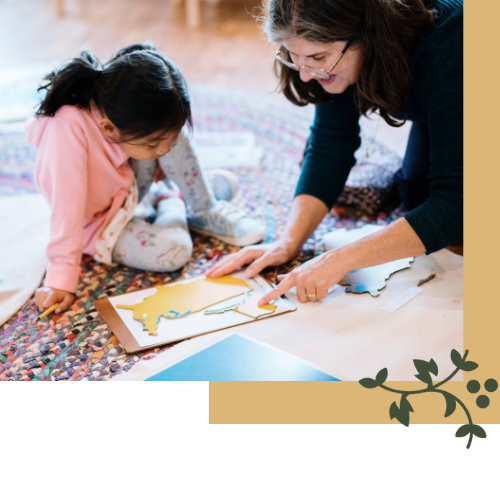
John XXIII's academic programs provide a springboard for expanded learning options specifically tailored to suit the educational needs of the child at his or her particular developmental stage.
Adhering to Montessori philosophy that education should be defined by “helping the child to help himself,” John XXIII assists the family in a reciprocal relationship wherein children are assisted in realizing their individual capacities.
Our Lead Guides have been trained and certified by the Association Montessori Internationale (AMI) and/or the National Association for Catechesis of the Good Shepherd (CGS) as guides to the child’s self-directed learning process.
The Step-Up Toddler Program
This learning-rich environment is specially designed with the needs and interests of the youngest child in mind, ages 1 ½ - 3 years, and in adherence with AMI and CGS guidelines.
Our Step-Up Toddler Program offers:
A child-sized environment that calls the toddler to engage in purposeful activities suited to his particular developmental needs.
Sensorial, manipulative materials for the development of hand/eye coordination, visual tracking and balance. These materials allow the toddler to absorb key concepts about their world, such as object permanence, color, dimension and weight, as well as cultivate the development of graceful and coordinated movements.
A safe, home-like space in which the toddler may begin practicing greater independence from his parents and which offers a first opportunity to engage in community life outside of the home, including interacting comfortably and respectfully with peers and non-parental adults.
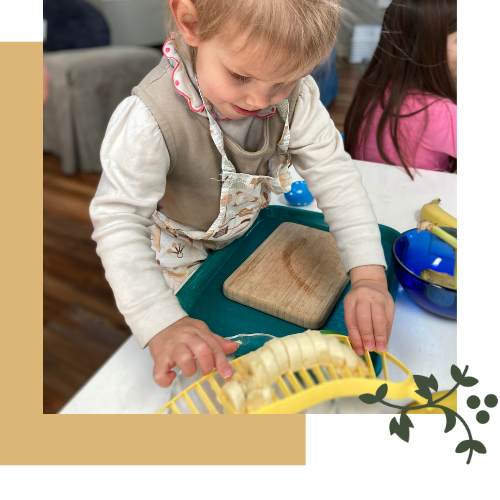
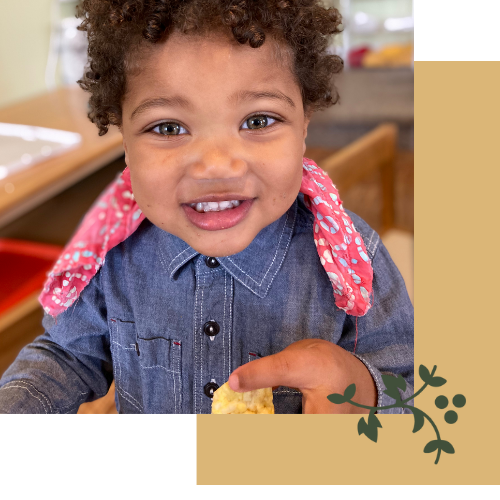
Child-led assistance with the challenging task of becoming toilet- independent.
A language-rich environment with many categorized language materials to expand and enrich the toddler’s ever increasing vocabulary, as well as specific focus on communicating one’s needs or desires respectfully with others.
Religious education through the CGS Atrium program, including the fostering of a relationship with God, delighting in the liturgical seasons and feasts of our Church, and many meditative materials about Jesus’ life and our life in the Church.
Opportunities for the young child to participate in real-life activities he sees accomplished by the adults in his life, such as food preparation, dish washing, sweeping, plant care, etc. These activities delight and fulfill as they meet the child’s desire to participate meaningfully in his society.
Primary Academic Program
Our Three or Four-Morning (full-day available for ages 5+) Primary Academic Program for ages three to six offers:
Introduction to mathematical skills beginning with the basics of numbers and quantities, to the introduction of algebraic concepts through work with binomial and trinomial cubes.
The expansion of language skills including vocabulary enrichment, phonics, reading, cursive writing, as well as development of the ability to articulate learned experiences and knowledge.
Physical, cultural, and political Geography of our world.
Religious education through the CGS Atrium program, which includes but is not limited to: fostering personal understanding and relationship with God, Parables, Nomenclature of the Mass, geography of the Holy Land, and seasons and colors of the Liturgical year.
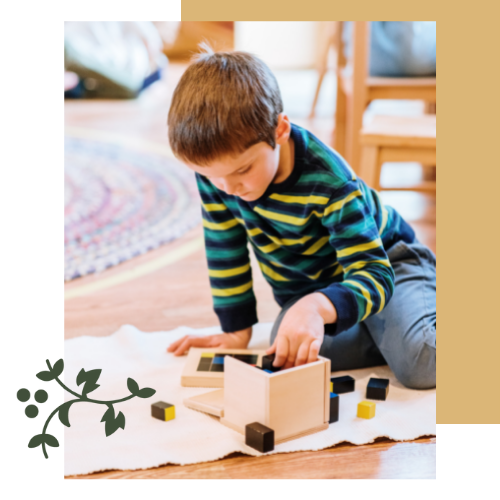
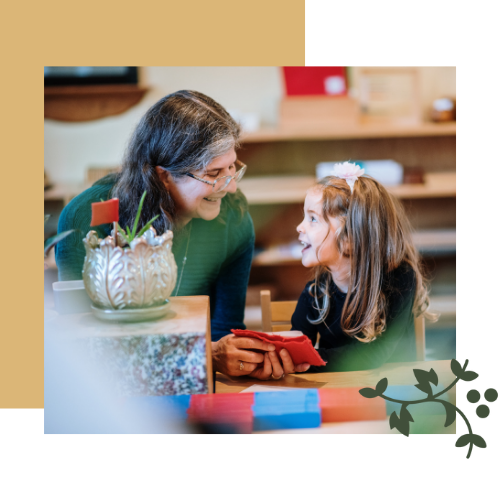
Development of etiquette and courteous behavior through demonstrations and modeling.
The opportunity for even the youngest child to begin to experience culture through art, music and traditions of the different countries of the world.
Sensorial materials that offer the child an experience with key aspects of the physical world such as: sight, taste, touch, smell, dimension, weight, temperature, texture, pitch and tone.
An opportunity for Kindergarten-age children to remain for the full day when exhibiting readiness for more advanced work.
Elementary Academic Program
Our Three or Four-Day Elementary Academic Program offers:
“Cosmic” education to wonder – a study of the whole universe, the history of life from Creation to present, prehistoric ages, ancient cultures, customs, peoples, and inventions which will inspire research, writing and art projects, and field trips to collect more information.
Study of the natural world of minerals, plants and animals through geology, biology and botany, and exploration of these sciences through experiments.
Cultural and political world geography through map-making, biomes, countries and capitals, flags, landforms and waterways.
Guided research papers and projects inspired by lessons in history, science and the physical world. Children share the fruit of their research and practice public speaking skills through group presentations to which parents are invited.
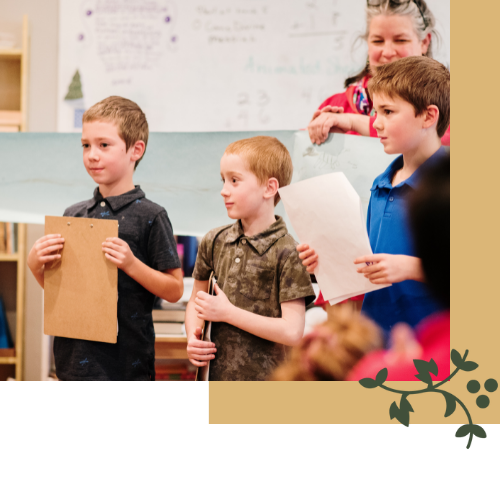
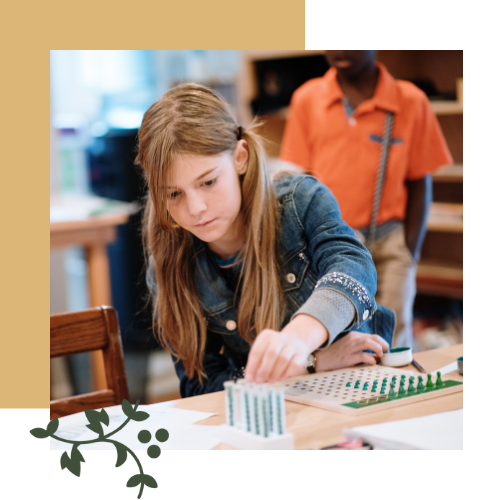
Child-led “Going Out” field trips into the community for further research. Leadership Conferences with guest speakers and projects to explore and encourage skills of peer and community leadership.
Religion through the CGS Atrium program including moral formation through prayer and study of Jesus’ Maxims for living, Scripture study, First Confession/Communion meditations, New and Old Testament typology, history and customs of the Jewish people, Structure and content of the Mass, the Seven Sacraments, the Ten Commandments, geography of Israel with mountains, waterways and cities.
Mathematical concepts as an aid to concrete thinking, visualized through hands-on materials including place value, long division, geometry, fractions, algebra and Pythagorean Theorem.
Language areas of phonics, reading, grammar and parts of speech, word study, and guidance for creative writing & compositions.
White Oaks Adolescent Program at John XXIII
A Montessori program is based on three-year cycles for completion (3-6 years, 6-9 years, and 9-12 years).
The three-year cycle for Primary and Elementary children allows them to reach developmental goals at their own pace in a mixed-age classroom. Each child is unique in his or her development and does not learn or grow at the same rate as every other child. A three-year cycle gives each individual the space necessary to reach critical educational benchmarks.
For homeschooling families that use John XXIII's curricula for only a portion of their children's academic education, the Center will guide children to work in all academic areas in accordance with parents' educational goals. We will reinforce learning and introduce opportunities for a well-rounded course of study within the context of the home and the larger community of the child. Due to the amount of time at the Center, Elementary children who attend John XXIII three days per week instead of four need in-home Math and English curricula.
